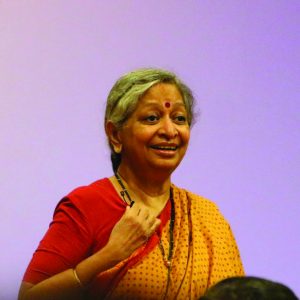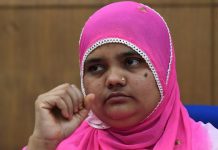 Edited Excerpts from an interview
Edited Excerpts from an interview
Katha, a pioneer among publishing houses in India, completed 30 years this year. Tell us how the journey so far has been.
Children and stories make Katha’s universe. Enhancing the joy of reading is our mission. Since 1988, Katha’s vision is the singular idea that children can bring themselves out of poverty. We endow children with quality schools, rich storybooks. Result? Reader-leaders! Our more than 100,000 “graduates” prove this!
I took India’s 2,000-year-old storytelling/theatre/dance tradition to hone a powerful communication tool for teachers to reach joyful learning to diverse students. It inspires our storybooks. Over the last 20 years, my StoryPedagogy(TM) is used in the Katha Lab School, 500+ government schools and many nonprofits. Story makes Katha’s classes come alive, makes learning relevant and creative.
Since 1990, we’ve revitalized marginalized communities, attracting mass collaboration and involvement of women and girls — over 250,000 from Delhi’s street and slums alone!
Our I Love Reading (ILR) campaign won the Millennium Alliance Award for frugal innovation; I was named ‘Innovator’. ILR is now mainstreamed; it is going national.
Katha’s work matters because every child reading well matters. Because every child counts! Katha hones the legacy of multiple literatures, the wealth of people, goodwill to build our capability. But it pains me to still see children dying of treatable diseases like diarrhoea and dehydration, something that had moved me 30 years back to create Katha. It is this urgency that vitalizes the continuous crusade to develop together, serve together.
Katha was recently asked to extend the Katha Lab School Model —StoryPedagogy — into Municipal Corporation of Delhi (MCD) schools. Tell our readers about how the KathaInside model is transforming these schools with robotics. Also, tell us about the Pipal Ped Vatikas (PPVs).
Katha’s success with reading has brought the partnership with the Government of Delhi to replicate our children reading proficiencies in government schools. A MoU has been signed that will allow Katha to help government schools to ramp up Katha’s reading campaign. This took the reading campaign to 500 government schools. Our externally evaluated work was so good that the government has given Katha five schools to run in 2016!
A philosophy-driven organization, Katha’s MeWe Ideology that I put in place in 2001, fosters the idea that each student becomes a responsive, responsible citizen. Our students and teachers believe in loka samastha sukino bavanthu — may all life forms be in peace.
Our well-written and illustrated books take the Katha philosophy forward, focusing on girls, earth, equality and kindness; global warming and sustainable ecology.
Our schools proactively build the capacity and skills of our children to help their communities get out of poverty, sustainably. Our strategy is to transform every child into a community leader and every child willingly contributes to the community through sustainable urbanization and consumption they learn through the curriculum.
I came back to India in 1985 with an IBM computer and its 8 MHZ of power. I thanked it each day when I began Katha and was designing our magazine, Tamasha! Today, Katha has more than a hundred computers. And everything, from our administrative, accounting, design, teacher education and networking happen through computers, contributing enormously to my growth.
My insistence on technology from the late 1980s has led to our setting up computer labs, Robotics and Modern Applications for Children (MACH Hubs) in Katha schools for our women’s economic growth and our Shopkeepers Guild.
We earned the Tech Museum Laureate award at the Stockholm Challenge in 2001! We haven’t looked back since.
Katha has transcended physical boundaries with DigitalKatha. Our first-of-its-kind website for government school teachers (padhopyarse.net) serves as an online resource. We have trained 100 cloud gurus. Each is now in charge of tech-driven learning for clusters of government school teachers. In 2016, we launched our ambitious 300 Million Challenge, with technology as a lever.
Katha has more than 65 Community Owned & Operated Libraries (COOLs) or learning centres that have been set up in people’s homes in Delhi. Tell us more about the idea behind this.
We claim helplessness in the face of entrenched poverty. We talk about our innate goodwill for families in marginalized communities. We would never dream of cutting a branch that we are perched on; of engaging children in building the glass and concrete aspirations of modern India. But we — as individuals, as governments — exploit every loophole our inadequate child labour law allows.
The pre-primary and primary school children of today are going to be the workforce of the 2030s. But there are few programmes for early school goers. What the 21st century needs is creativity, innovation, problem-solving, entrepreneurship and a drive to excel. But basic education seems to be less important in the grand scheme of things than the mission of skilling the Indian youth by the lakhs.
So, we are not fazed by a UNESCO report of September 2016 that says, “India will be half a century late in achieving its universal education goals; hence, we will achieve universal primary education only by 2050; universal lower secondary education only by 2060; and universal upper secondary education only by 2085!”
The community libraries were set up with a simple idea behind it. Our grassroots volunteers came forward for the cause. They were happy to run these libraries. We did massive book donation drives and collected over 30,000 storybooks.
Katha Khazana, Katha’s first reading app, has animation, games, characters and narration. Tell our readers what to look forward to in this app.
Katha Khazana uses the power of immersive storytelling as a legitimate pedagogical tool to help children from the age of 4 to 12 read for fun and meaning. The user-friendly app is entirely in Hindi and has six of Katha’s stories available as digital books, animated videos as well as interactive games. Free for all, it connects volunteers with children from under-served communities to enable digital learning. Based on Katha’s StoryPedagogy TM, the narrative revolves around themes of gender equality, inclusivity and
diversity and contributes to a child’s holistic growth.
Katha also has an interesting THINKBOOKS series for children on issues like global warming, environment, etc. Tell our readers more about this series.
Katha recently launched its Thinkbook series with an aim to draw the attention of young minds to big ideas such as kindness, climate change, gender, etc. The series comprises five books: My Big Book of Earth, My Big Book of Global Warming, My Big Book of Kindness, My Big Book of Girls and My Big Book of Dogs.
These are designed for easy reading and reference, with illustrations and photographs. These anthologies of fiction, non-fiction and poetry pieces will also provide useful material for classroom projects, debates and discussions.
The Thinkbook series project was generously supported by Ashoka Changemakers for the Public and Oracle Giving for young changemakers.
My Big Book of Kindness will help young readers understand the indispensability of being kind. My Big Book of Earth and My Big Book of Global Warming explore pertinent issues of environmental protection and conservation, and examine the effects of global warming. My Big Book of Girls is a book that challenges gender stereotypes and provokes with its galvanizing words and illustrations. Lastly, My Big Book of Dogs is all about our canine friends and their presence that can foster our lives with positivity.
Katha’s 300m Challenge campaign is aimed at making every child read. Tell us more about this campaign.
By the year 2030, India will have 590 million people — nearly twice the current US population — living in its cities. The youth segment of this population is expected to include 170 million workers. These are the preschoolers of today. And yet this very important constituent is practically overlooked in all our policy plans and pronouncements. So much so that in a 2016 UN report on world cities and their outlook (UN World Cities Report 2016: Urbanization and Development — Emerging Futures), “children” or “education” have not even a sub-section!
The best and brightest from more privileged backgrounds will choose to go abroad — despite Mr Trump. But we seem to have no plan and no real sense of urgency when it comes to those left behind.
But it doesn’t have to be this way. We, the people, can make a difference. We can question governments and advocate on behalf of children. I’ve met hundreds of compassionate individuals in the course of my work who believe that “we do not inherit the earth from our ancestors; we borrow it from our children.”
A situation in which 50 per cent of three hundred million children in school can’t read, needs action. Now! And the call is more urgent when we know that 150 million of those children are 5 to 10 years olds.
“If you want your children to be intelligent, read them fairy tales. If you want them to be more intelligent, read them more fairy tales,” said Albert Einstein. “All religions, arts and sciences are branches of the same tree.”
That “tree” is Imagination and it is something we need to nurture for ALL our children. The elephant has been in the room for a while and it’s time we acknowledged its presence.
So, I end with some questions and a request:
What if our children had books that got them to think about compassion, kindness and caring for all life forms, including the many humans who have no voice of their own?
What if schooling helps break stereotypes and reiterate ideas of equity and equality, while enabling children to move away from the debilitating forces of mass media to a more gently critical culture? Let’s make testing more rigorous, but let’s ensure that passing/failing is a combined responsibility of children, parents and teachers.
What if educators were thought leaders who fill curricula and classrooms with imagination — fiction, nonfiction and poetry that originated in India, from our different bhashas, in translation into all school languages, so helping children culture link, understand where they come from, who they are — stories that will encourage them to delve into the depths of life’s predicaments, giving children the space to be confident, creative, critical thinkers.
What if our children then went ahead to create a nicer, more sustainable world for themselves through reading, supported learning, realizing the importance of gender equality, global climate change, sustainable consumption?
It is serendipitous that we have 150 million children who can read and 150 million who cannot. Each one teach one: what a simple elegant solution to a vexing conundrum (There is a reason why I am often called an eternal optimist!).
These goals are the motivation behind the 300 Million Challenge, developed by us at Katha, the “profit for all” social organization, with help from a group of incredible and passionate partners —spanning individuals, small to large nonprofits as well as the corporate sector.
We want to ensure that all 3 to 10-year-old children are reading well and for fun at an early age. School readiness is a critical factor for lifelong learning and sustainable education. We strongly believe that the government school system should be made more robust. And that all children need equitable quality; democratic education for sustaining our democracy. And that when children understand they can bring sustainable change to themselves, they begin to understand the emotional and the economic purpose of education, leading to sustainable lifelong learning.
Disruptive and collaborative innovation in primary education is possible only when we all join hands when we together make children’s sustainable learning happen! Let’s make it everyone’s business and our collective mission — to be a country where every child counts.
letters@tehelka.com












